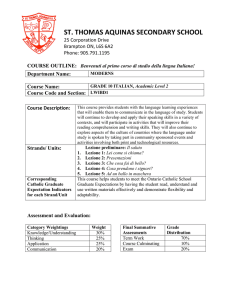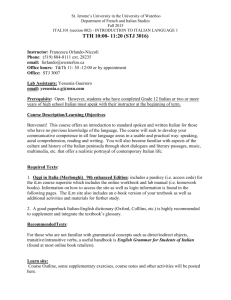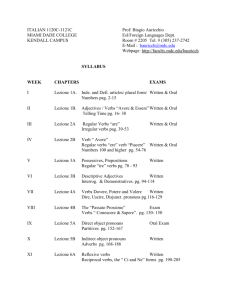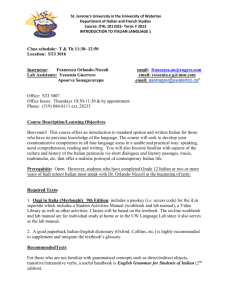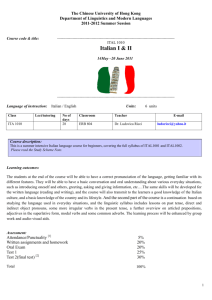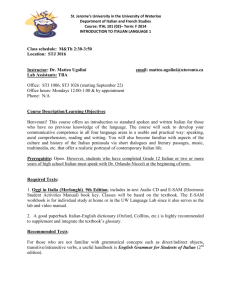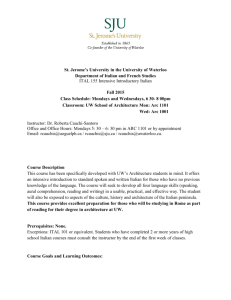Ital 102 W14 - St. Jerome's University
advertisement
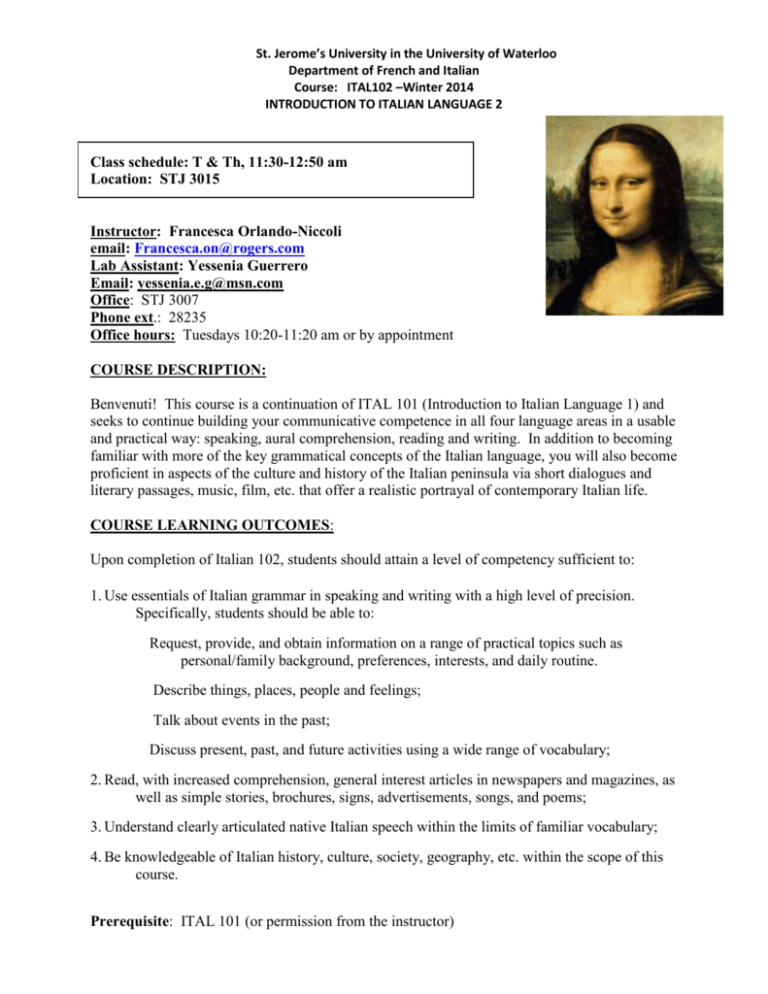
St. Jerome’s University in the University of Waterloo Department of French and Italian Course: ITAL102 –Winter 2014 INTRODUCTION TO ITALIAN LANGUAGE 2 Class schedule: T & Th, 11:30-12:50 am Location: STJ 3015 Instructor: Francesca Orlando-Niccoli email: Francesca.on@rogers.com Lab Assistant: Yessenia Guerrero Email: yessenia.e.g@msn.com Office: STJ 3007 Phone ext.: 28235 Office hours: Tuesdays 10:20-11:20 am or by appointment COURSE DESCRIPTION: Benvenuti! This course is a continuation of ITAL 101 (Introduction to Italian Language 1) and seeks to continue building your communicative competence in all four language areas in a usable and practical way: speaking, aural comprehension, reading and writing. In addition to becoming familiar with more of the key grammatical concepts of the Italian language, you will also become proficient in aspects of the culture and history of the Italian peninsula via short dialogues and literary passages, music, film, etc. that offer a realistic portrayal of contemporary Italian life. COURSE LEARNING OUTCOMES: Upon completion of Italian 102, students should attain a level of competency sufficient to: 1. Use essentials of Italian grammar in speaking and writing with a high level of precision. Specifically, students should be able to: Request, provide, and obtain information on a range of practical topics such as personal/family background, preferences, interests, and daily routine. Describe things, places, people and feelings; Talk about events in the past; Discuss present, past, and future activities using a wide range of vocabulary; 2. Read, with increased comprehension, general interest articles in newspapers and magazines, as well as simple stories, brochures, signs, advertisements, songs, and poems; 3. Understand clearly articulated native Italian speech within the limits of familiar vocabulary; 4. Be knowledgeable of Italian history, culture, society, geography, etc. within the scope of this course. Prerequisite: ITAL 101 (or permission from the instructor) Required Texts: 1. Oggi in Italia (Merlonghi). 9th Edition; includes in-text Audio CD and E-SAM (Electronic Student Activities Manual) book key. Classes will be based on the textbook. The E-SAM workbook is for individual study at home and it also serves as the lab and video manual. 2. A good paperback Italian-English dictionary (Oxford, Colllins, etc.) is highly recommended to supplement and integrate the textbook’s glossary. Recommended Texts: For those who are not familiar with grammatical concepts such as direct/indirect objects, transitive/intransitive verbs, a useful handbook is English Grammar for Students of Italian (2nd edition). Grading Scheme Attendance & participation (10%), completion of iLrn homework (5%) Tutorial (10%): 25% You will be involved in a series of interactive activities to acquaint you with new language structures and review homework. PARTICIPATION and ATTENDANCE are integral components of the course and will affect your performance and evaluation. EVERY WEEK online homework/lab activities are due from the iLrn website. Attendance at a weekly tutorial is also mandatory for all students (TUTORIALS BEGIN the 2nd WEEK OF CLASSES). Due MARCH 4th, 2014. This is a group project that you will Oral Presentation: 10% complete on a topic to be decided upon in consultation with your instructor. You will be given more information about what is required, the marking rubric, etc., at a later date. Quizzes: 30% (3 at 10% each) THREE quizzes will be administered over the course of the term and are based on selected topics from the course material covered up to that point. Each deals with aspects of grammar and/or vocabulary and/or culture and is generally approximately 20 minutes in duration. Midterm Test: 15% The midterm test will cover a substantial quantity of topics (grammar, vocabulary, culture, etc.) discussed in class. The test will last approximately 80 minutes. NOTA BENE: Please read the section 5. entitled Absences carefully Final Exam: 20% The final exam is an IN CLASS examination and will cover all the material presented during the course. It will take place during regular class time on the final day of classes. All of this means that you are expected to: check the following syllabus regularly for test dates, assignment due dates, homework, etc. come to class once a week PREPARED to practice new structures and expressions attend your weekly scheduled tutorial HAVE FUN! Data e capitolo Course Schedule Vocabolario/ Strutture ed Cultura uso iLrn LAB iLrn WORKBOOK 7-9 gennaio INTRODUCTION TO COURSE REVIEW of Lezioni 1-6 14-16 gennaio Lezione 7 21-23 gennaio Lezione 8 Il mercato rionale I cibi La Liguria Verbi riflessivi Imperativo informale Lezione 7: 1-4 Lezione 7: A, B, D-H, N-P I numeri da 100 in poi Un grande porto di mare Imperativo formale Partitivo con ‘di’ Lezione 7: 5-8 Lezione 7: C, I-M, Q,R La famiglia italiana Famiglia e parenti Venezia Dovere, potere, volere Pronomi diretti Lei viaggia? Una regione ricca Aggettivi e pronomi dimostrativi questo Lezione 8: e quello 5-10 Che tempo fa? Espressioni di tempo La Puglia Bari, Brindisi e Taranto Imperfetto Pronomi personali di forma Lezione 9: tonica 1-10 Espressioni negative QUIZ 1, 21 gennaio 28-30 gennaio Lezione 8 4-6 febbraio QUIZ 2, 4 febbraio 11-13 febbraio Lezione 10 17-21 febbraio READING WEEK Lezione 8: 1-5 Lezione 8: A-E, H-L Lezione 8: F, G, M-Q Lezione 9: All 25-27 febbraio MIDTERM, 25 febbraio 4-6 marzo Lezione 10 ORAL TOPICS DUE March 4 11-13 marzo Lezione 11 Milano Contrasto fra Abbigliamento, imperfetto e tessuti e colori Passato prossimo Il Cinema Italiano Vestire bene FILM IN CLASSE Plurale di alcuni nomi ed aggettivi Sapere, conoscere Lo sci in Italia Il corpo umano Oggetti personali utili Pronomi indiretti Costruzioni con ‘piacere’ Torino Il Piemonte Ripasso pronomi indiretti Verbi riflessivi (reciprocita’) Lo sport Gli sport in Italia La Calabria Futuro semplice Lezione 10: 1-5 Lezione 10 5-10 Lezione 10: A-F, K, L Lezione 10: G-J, M-O Lezione 11: 1-5 Lezione 11: A-G, M-O Lezione 11: 6-10 Lezione 11: H-L Lezione 12 5-7 Lezione 12 : A-F QUIZ 3, 11 marzo 18-20 marzo Lezione 11 25-27 marzo Lezione 12 PRESENTAZIONI ORALI 25-27 marzo 1 aprile RIPASSO ESAME FINALE 3 aprile ESAME FINALE IN CLASSE 11:30-12.50 am Buon proseguimento!! Your instructor, Francesca Orlando-Niccoli, invites you to enroll in the following course. Course: ITAL 102 Code: RKD996 Oggi in Italia 9th Edition eStudent Activities Manual Book: (eSAM) Creating a Heinle Learning Center Account If you do not have an account, you need to create one. To do so, follow these steps: 5. Go to http://ilrn.heinle.com and click LOGIN. 6. Click the Create account button. 7. Select a username and password and enter your information, then click Submit. Note: Remember to write down your username and password and be sure to select the correct time zone. Also, please enter a valid e-mail address so we can send you your password if you forget it. Entering the Book Key and Course Code Enter the book key and course code to complete the enrollment process. You may already have a book key, or you may need to purchase a book key. Depending on your situation, use one of the procedures below. If you activated the book for a previous course, you can start at step 5 of I already have a book key below. Once you have completed this step, the system lists the course and book on the Student Workstation home page. To enter additional books, enter a book key in the Enter field and click Go. Note: Book keys can only be used once. Your book key will become invalid after you use it. I already have a book key 1. Go to http://ilrn.heinle.com and click LOGIN. 2. Enter your username and password and click Log in. 3. At the top of the page, enter your book key and click Go. 4. Click Confirm to confirm your registration information. Your book will appear under the My books heading. 5. Beside the book listing, enter the course code RKD996 in the Enter course code field and click Go. 6. If necessary, select a class or section and click Submit. I need to purchase a book key 1. Go to http://ilrn.heinle.com and click LOGIN. 2. Enter your username and password and click Log in. 3. At the top of the page, enter the course code RKD996 and click Go. 4. If necessary, select a class or section and click Submit. The course and books will appear under the My classes heading. 5. Locate the book and click buy. 6. Proceed through the purchase process. Note: If the buy link does not appear in Step 5, contact your instructor for information about obtaining a book key. Using Heinle Learning Center To access your Student Workstation in the future, go to http://ilrn.heinle.com and log in. Here, you can open your book, submit activities, view your results, and view your instructor's feedback. If you have any questions, contact Heinle Learning Center Support at http://hlc.quia.com/support. Important information 1. Online workbook/lab activities are to be completed by the MONDAY of the following week in which they are assigned in your syllabus. Completing these exercises on time is YOUR RESPONSIBILITY! 2. Special Needs: The Office for Persons with Disabilities (OPD), located in Needles Hall, Room 1132, collaborates with all academic departments to arrange appropriate accommodations for students with disabilities without compromising the academic integrity of the curriculum. If you require academic accommodations to lessen the impact of your disability, please register with the OPD at the beginning of each academic term. For further information, please look at their website at http://www.studentservices.uwaterloo.ca/disabilities/ 3. Student Conduct: You should be aware that the St. Jerome’s University has specific regulations in place concerning appropriate behaviour, both academic and otherwise. You are expected to be familiar with these regulations and to abide by them at all times (for policies, go to http://secretariat.uwaterloo.ca/Policies). Your attention is drawn to Section 33 concerning ethical behaviour, as well **Students are advised that the use of electronic devices in the classroom (cell phones, PDAs, laptops, etc.) is STRICTLY PROHIBITED at all times, unless previously authorized by the instructor. Students caught texting, emailing, etc. will first be given a warning. A second infraction will result in the confiscation of the device for the remainder of the class period. ** 4. Absences: 4.1. Active and regular participation in a language course is crucial to your ability to master key concepts and vocabulary and will directly influence your progress in this course. Remember, this course meets only once a week and therefore missing even one class is like missing an entire week of classes! 4.2 Graded term work (Quizzes, Exams) has been clearly scheduled in your syllabus. If you are absent on the day of a quiz you WILL NOT be given an opportunity to re-write. Instead, you must present me with a completed University of Waterloo Verification of illness form, whereupon the value of the missed assignment will be added to the value of the next assignment. For example, if you miss Quiz 1 (worth 10% of your final grade), Quiz 2 will then be worth 20% (10%+10%). If you are absent for either the midterm or the final due to illness or other extenuating circumstances you are required to present your instructor with a completed University of Waterloo Verification of Illness form (found at http://www.healthservices.uwaterloo.ca/Health_Services/abouths.html). You may then be given an opportunity to write a different test at a time to be decided upon in consultation with your instructor. 4.3 Students are forewarned NOT to schedule holiday or other travel until the end of the winter examination period. The final examination for this course is scheduled for the final class meeting, March 29th, 2012 from 11:30-12:50am. UW POLICY REGARDING ILLNESS AND MISSED TESTS The University of Waterloo Examination Regulations (www.registrar.uwaterloo.ca/exams/ExamRegs.pdf) state that: A medical certificate presented in support of an official petition for relief from normal academic requirements must provide all of the information requested on the “University of Waterloo Verification of Illness” form or it will not be accepted. This form can be obtained from Health Services or at www.healthservices.uwaterloo.ca/Health_Services/verification.html. If a student has a test/examination deferred due to acceptable medical evidence, he/she normally will write the test/examination at a mutually convenient time, to be determined by the course instructor. The University acknowledges that, due to the pluralistic nature of the University community, some students may on religious grounds require alternative times to write tests and examinations. Elective arrangements (such as travel plans) are not considered acceptable grounds for granting an alternative examination time. 7. OTHER INFORMATION Academic Integrity: In order to maintain a culture of academic integrity, members of the University of Waterloo and its Federated University and Affiliated Colleges are expected to promote honesty, trust, fairness, respect and responsibility. Discipline: All students registered in courses at St. Jerome’s University are expected to know what constitutes academic integrity, to avoid committing academic offences, and to take responsibility for their actions. A student who is unsure whether an action constitutes an offence, or who needs help in learning how to avoid offences (e.g., plagiarism, cheating) or about “rules” for group work/collaboration should seek guidance from the course professor, academic advisor, or the Associate Dean. When misconduct has been found to have occurred, disciplinary penalties will be imposed under St. Jerome’s University Academic Discipline Policy and UW Policy 71 – Student Discipline. For information on categories of offenses and types of penalties, students should refer to Policy 71 - Student Discipline, www.adm.uwaterloo.ca/infosec/Policies/policy71.htm. Grievance: A student who believes that a decision affecting some aspect of his/her university life has been unfair or unreasonable may have grounds for initiating a grievance. In such a case, contact the St. Jerome’s University Grievance Officer. Read St. Jerome’s University Handbook, Section4, item 8, www.sju.ca/faculty/SJU_handbook/grievance_policy.html. Appeals: A student may appeal the finding and/or penalty in a decision made under St. Jerome’s University Academic Discipline Policy or Grievance Policy if a ground for an appeal can be established. In such a case, contact the St. Jerome’s University Appeals Officer. Read St. Jerome’s University Handbook, Section 6.4, www.sju.ca/faculty/SJU_handbook/examinations_grades_standings_and_appeals.html. Academic Integrity website (Arts): http://arts.uwaterloo.ca/arts/ugrad/academic_responsibility.html Academic Integrity Office (UW): http://uwaterloo.ca/academicintegrity/ Turnitin: Plagiarism detection software (Turnitin) will be used to screen assignments in this course. This is being done to verify that use of all material and sources in assignments is documented. In the first lecture of the term, details will be provided about the arrangements for the use of Turnitin in this course.
